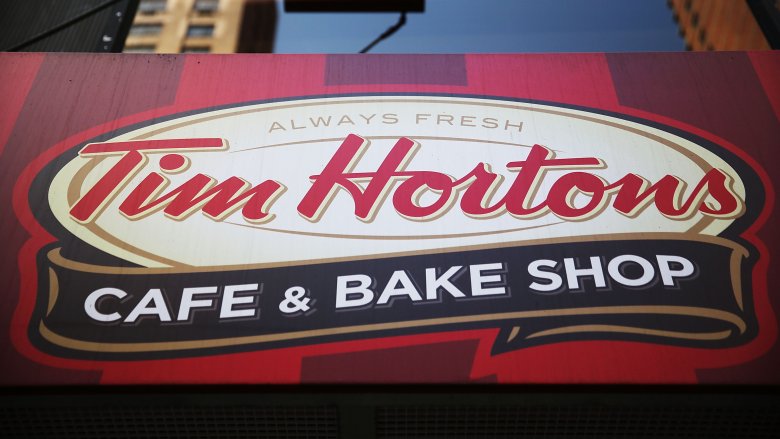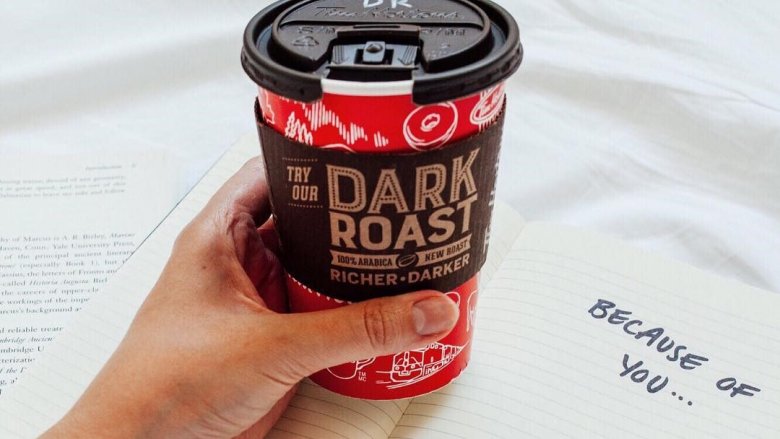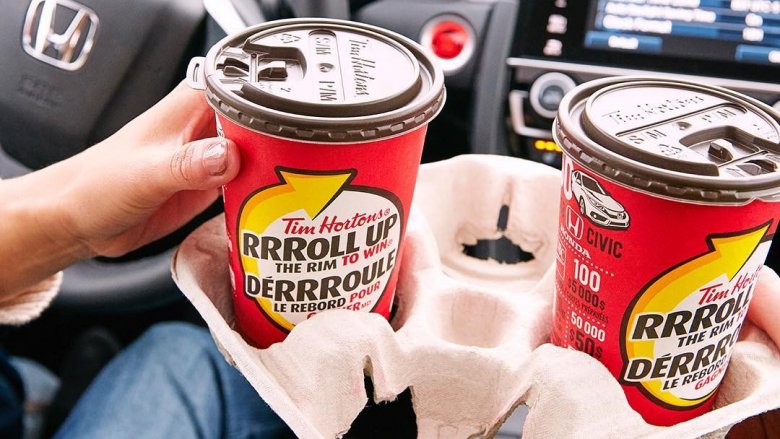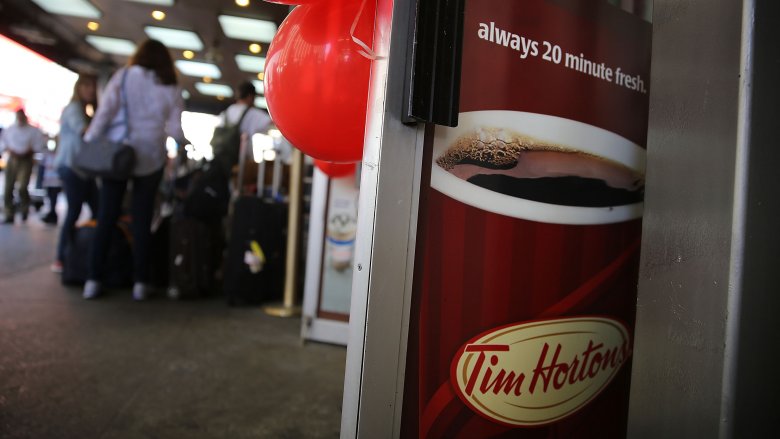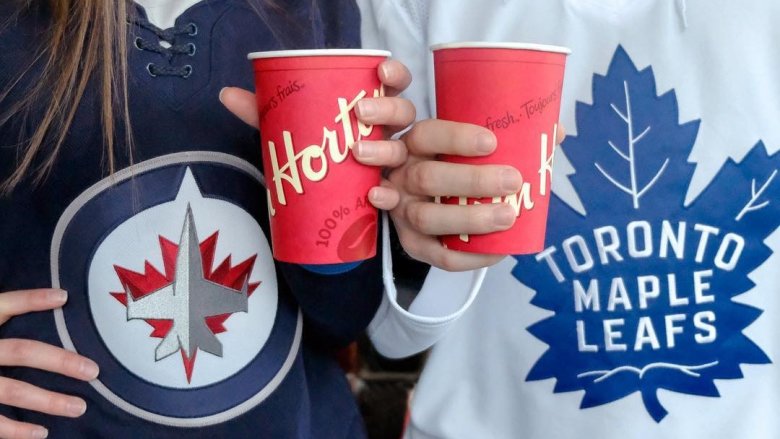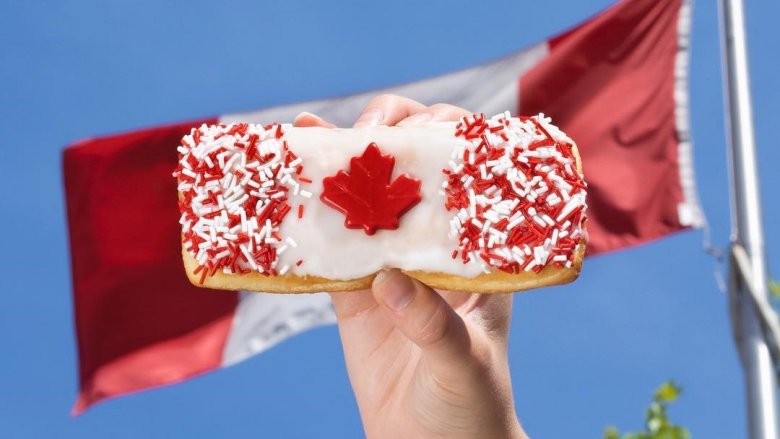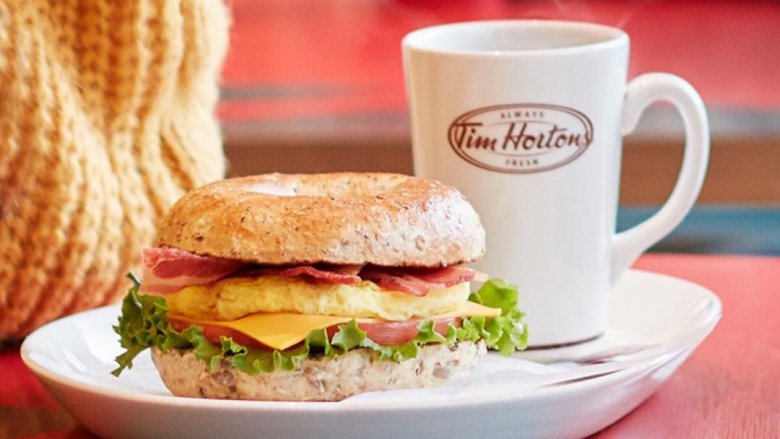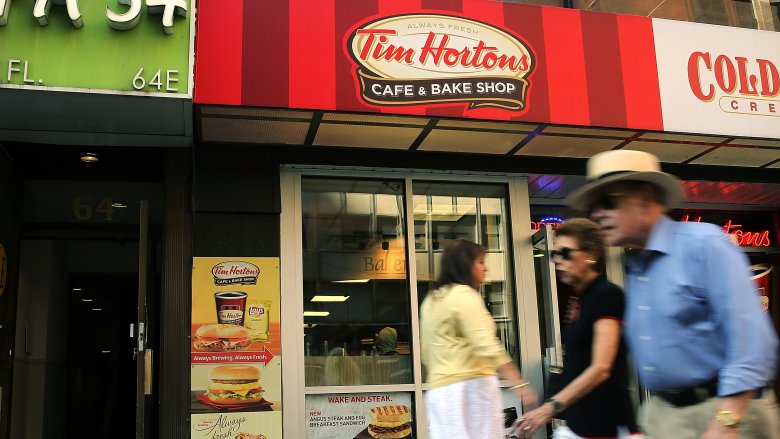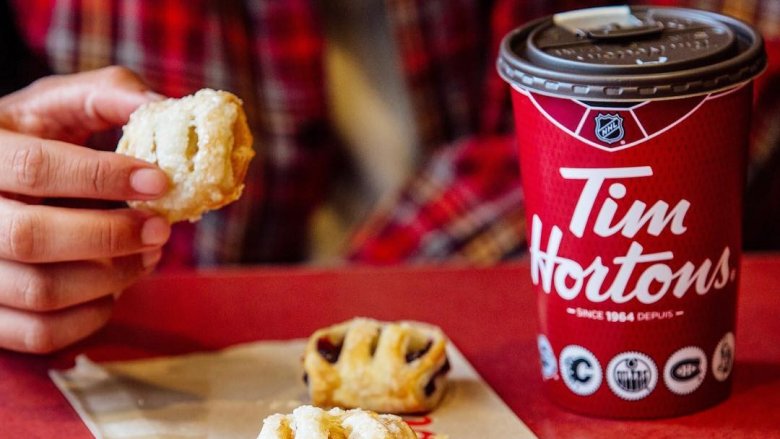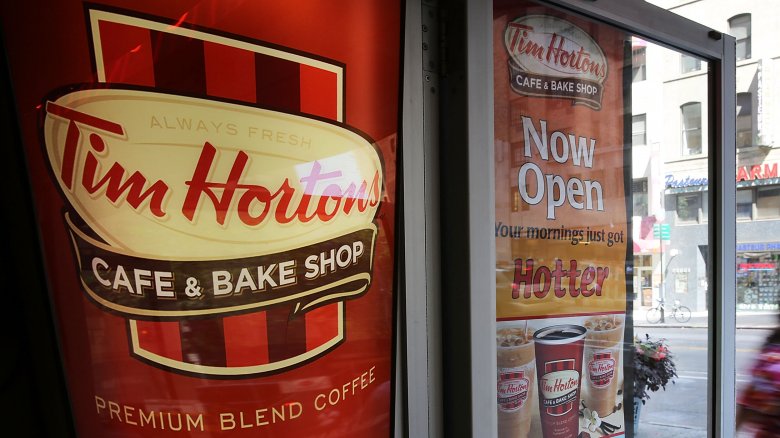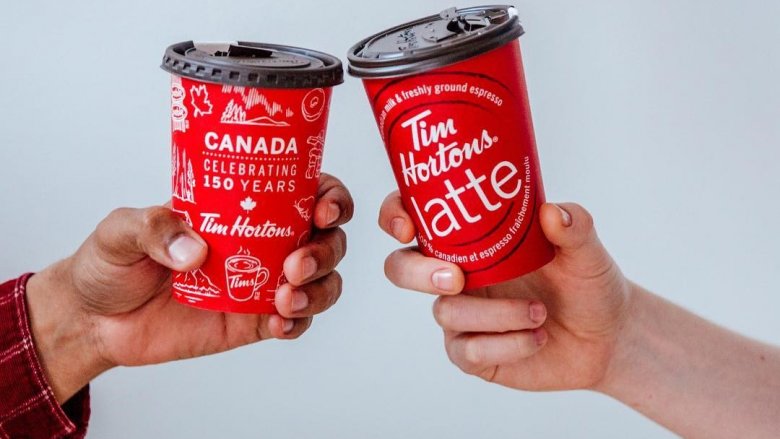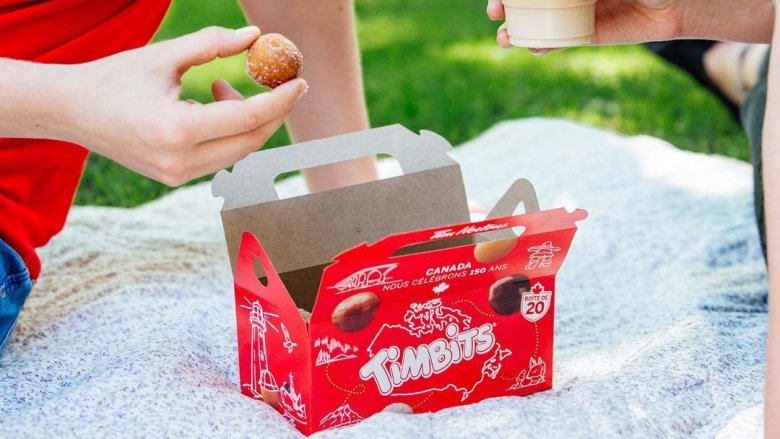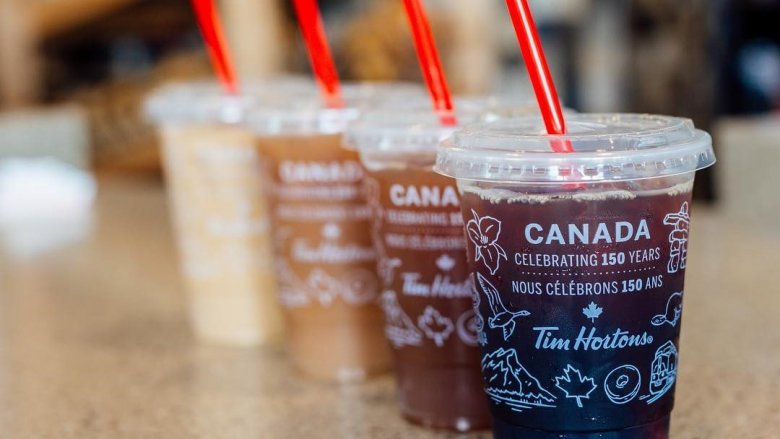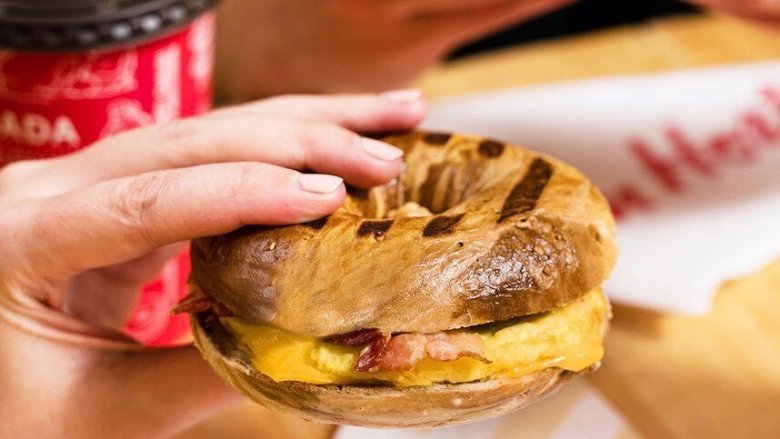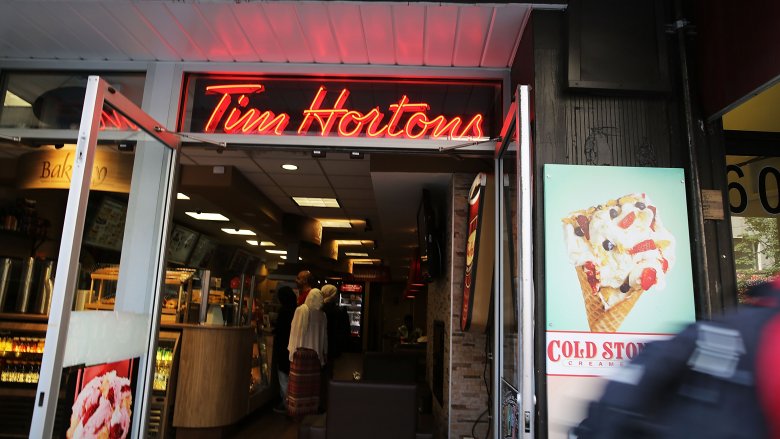The Untold Truth Of Tim Hortons
You can tell a lot about a person by where they choose to get their coffee. Fans of Tim Hortons are definite, die-hard fans of Timmie's — and they're usually pretty proud to tell you all about it. All coffee shops inspire a certain amount of brand loyalty, but Tim Hortons inspires loyalty on a whole different scale. Fans of the chain will you that their Timbits are legendary, their coffee is the subject of a weird urban legend (that we'll get to the bottom of), and Roll-up-the-Rim season can give Christmas a run for its money when it comes to sheer excitement. What's left to know about this Canadian icon? Lots!
It started really small
Tim Hortons wasn't always the coffee-and-donut icon it is today. All fans know Horton was a real person, a hockey player who suited up for the Toronto Maple Leafs, Pittsburgh Penguins, New York Rangers, and the Buffalo Sabres. According to Historica Canada, Tim Horton always had a desire to get into the restaurant business, but it was only when he met a Montreal businessman named Jim Charade that he got the chance. Charade owned a donut joint only two doors down from Horton's go-to barber, and the pair formed Timanjim, Ltd. the same year they met.
They started out with four restaurants serving up burgers and chicken, and later opened another serving donuts and coffee. It wasn't just Tim Hortons to begin with, either, it was Tim Horton Donuts — and it was tiny. They sold coffee for 10 cents a cup, and only had two kinds of donuts, apple fritters and Dutchies.
The majority of their coffee isn't Canadian at all
Tim Hortons might have a reputation as being the coffee company from America's friendly northern neighbor, but when it comes to their coffee, there's a surprising source. All that coffee that goes into those famous double-doubles is actually roasted, packaged, and shipped from the States. It comes through a processing plant in Rochester, New York, to be precise, and that's sort of appropriate. It's not too far from Buffalo, where Horton spent some of his career donning his skates for the Sabres.
The Democrat & Chronicle got an inside look at the processing plant, which sprawls over 40,000 square feet and only employs 37 people to make all the coffee Tim Hortons stores across the US and parts of Canada need (some Canadian stores are supplied by a Canadian processing facility). How much coffee comes out of Rochester? A whopping 20 to 30 million pounds every year.
Roll Up The Rim is sort of unfair
Roll Up The Rim is so popular it's pretty much a fifth season, and adults look forward to it as much as kids look forward to summer. Sure, you have the chance to score free food, free coffee, and awesome other prizes, but depending on where you are (and what you order), you may have a higher — or lower — chance to win based on where you live.
Tim Hortons hands out winning cups based on geography, instead of basing it on population. One blogger took a close look at the numbers and concluded that you have the best chance of winning big prizes if you live in British Columbia, Ontario, or any of the Atlantic Provinces.
Here's another fun fact you should probably know before you start ordering. According to an informal survey conducted by HuffPost, you're more likely to win a prize if you order a large drink — and least likely to win if you're only ordering small.
No, there's not anything added to the coffee to make it more addicting
People who love Tim Hortons really, really love Tim Hortons, and if you're used to picking up a coffee on your way to work, you'll feel it if you're forced to skip a morning. That's given rise to a ton of rumors there's something added to their coffee to make it extra addicting, and theories range from having it super-caffeinated to even dosed with nicotine or MSG.
None of it is true, and you can rest assured knowing it's just an urban legend. It's so prevalent a legend Tim Hortons even addresses it on their official FAQ, and The Torontoist adds that not only would adding nicotine to coffee be illegal, but also pretty dangerous. They tried to track down the source of the urban legend and while they didn't find that, they did find Tim Hortons isn't the only one to be the target of that exact same story. McDonald's was even accused to adding nicotine to their burgers to make them more addictive — if you needed more proof it's an urban legend, there it is.
"Double-double" made it into the dictionary
Any Tim Hortons fan knows what a double-double is, even if you don't order it yourself. You'll also be happy to know that it's become such an iconic thing that in 2004, CBC News reported "double-double" was among the new words included in the Canadian Oxford Dictionary.
That's a pretty big deal, too. While you usually think of a dictionary as documenting a huge number of words you're just never going to use, Katherine Barber, editor-in-chief of the book, says their goal was to create a dictionary that "accurately reflects how Canadians speak and write in the 21st century". Based on how many times a day people across the country are asking for a double-double, we'd say it's a completely legit addition.
And in case you're one of the few that doesn't know: A "double-double" is a coffee with two creams and two sugars.
They weren't a Canadian company (for a bit)
In 1995, one of the most unlikely buyers took over Tim Hortons: Wendy's. The purchase made this quintessentially Canadian company American-owned, and according to CBC News, it was something Canadians were pretty much used to. It happened to other giants — like Molson — but when it came to Tim Hortons there was a lot of confusion.
Wendy's bought Tim Hortons for a whopping $580 million, and later went public. After the purchase, Wendy's gave all their baking operations to Maidstone Bakeries, another company they owned — but Maidstone was sold to Swiss investors in 2010.
We're not even done. In 2014, Wendy's sold Tim Hortons to Restaurant Brands, which is controlled by a Brazilian investment firm but is based in Toronto, according to Inc. They're the company that also owns Burger King and Popeyes. Canadians as a nation haven't been happy with the results of the ownership, and it hasn't helped that Restaurant Brands is almost fanatically tight-lipped about what goes on there (via CNBC).
They've impacted Canadian culture more than you think
There's nothing more Canadian than hockey and maple syrup... or is there? In 2016, CBC reported on Canada's place at the top of coffee-drinking nations. They came in third for per-capita consumption (beneath only the Netherlands and Finland), and a few things were said to contribute to coffee's popularity. One was their notoriously long, cold winters, and the other was the fact Tim Hortons became such a cultural touchstone. At the time, there was one location for every 9,000 Canadians, and if that doesn't sound like many, let's put it in perspective. At the same time, there was one Starbucks for every 26,000 Canadians.
By 2017, more Canadians were getting their morning coffee at McDonald's than at Tim Hortons (via Macleans), but Tim Hortons has also made another major contribution to Canadian cuisine by increasing the popularity of the donut. It happened for a very cool reason. According to The Hill Times, Tim Hortons became popular about the same time Canada welcomed around 300,000 immigrants to their shores. Those immigrants saw donuts — and Tim Hortons — as an important part of the identity of their new homeland, and Canadians were totally down with that.
But they're in some serious trouble
Hortons might be a cultural icon in Canada, but 2018 was the year secretive owners and bad press caught up to their bottom line. According to CBC News, that's the year Tim Hortons plummeted down through the rank of public opinion, as collected by the market research firm Leger. Their surveys put together a picture of just how well brands are doing in the court of public opinion, and Tim Hortons — which held the number four spot in 2016 — dropped all the way to number 50.
That's been reflected in the fluctuating value of their parent company, too. According to CNBC, sales were also slipping. They blamed their own public image and an increased competition from Dunkin' Donuts and McDonald's, who is investing heavily in their coffee game. Expect to see Tim Hortons — and the people behind the curtain — trying to improve media relations, image, and technology to try to stop a downward trend.
The founder's image was removed from restaurants
Tim Horton was killed in a car accident on February 21, 1974, when he was heading to Buffalo after playing for the Sabres in a match against his former Leafs teammates. According to the Ottawa Citizen, it wasn't until 2005 that details of his autopsy were released, and they revealed some uncomfortable things about this hockey icon.
Horton had more than twice the legal limit of alcohol in his system, along with a drug called Dexamyl. (It was a legal prescription drug at the time, a mix of barbiturates and dextro-amphetamines.) That's about the time you might have noticed photos of Horton disappearing out of his restaurants, and it wasn't until 2014 there was a public movement to try to put them back in. While some defended his actions by saying the drug was legal at the time and he was taking it in order to stay competitive with guys half his age, the other defense of his actions — that there wasn't as much of a stigma against drunk driving then as there is today — still doesn't make any of it right, and his death is uncomfortably problematic.
Corporate is involved with a huge fight with their franchisees
If you think owning a Timmie's franchise must be a fun gig, you might be surprised at some of the conflicts going on behind the scenes. In October 2017, franchisees filed an $850 million class action lawsuit against Restaurant Brands International Inc., the Brazilian-based company that now oversees Tim Hortons franchises. According to the suit (via the Financial Post), the group was resorting to bullying and intimidation tactics to force troublesome owners out of their franchises. Why were they being viewed as troublesome? Because some had organized into an association to deal specifically with the difficulties franchisees were having with those corporate overseers. The association had filed a class action lawsuit back in June of 2017, too, looking for $500 million over alleged mismanagement of advertising funds and continuously rising costs passed on to the franchisees.
As for corporate's side of the story, they alleged the association had spilled valuable trade secrets, and that was the reason they were being served with default notices on their franchises, although The Star reported board members were denying they had done any such thing.
Minimum wage went up... and people hated their response
In 2018, Ontario raised their minimum wage from $11.40 to $14, with a caveat that it would be increasing to $15 in 2019. That's a huge hike, and Tim Hortons' response didn't go over well with anyone.
Basically, when neither corporate or franchisees were willing to cover the increase in wages, they decided to start cutting in other places to make up the difference. Take one franchisee in Ontario, who Macleans says had a particularly terrible response. They sent letters to all their employees, asking them to sign a document that meant they would agree to start paying for half of their benefits and give up their paid breaks to cover the cost of their raise. Pretty low, right? The punchline is that the franchisees we're talking about here are Ron Joyce Jr. and Jeri-Lynn Horton-Joyce, the son and daughter-in-law of Horton co-founders. To put things in perspective, Joyce's father has a net worth of around $1.57 billion.
The fact that the billionaires were telling their employees they weren't getting a raise without also getting some serious cuts to benefits went over about as well as you might expect. With many other franchisees — they're not all billionaires, after all — simply unable to cover the cost increase, the news led to infighting, and a trickle-down effect that did the most damage to the employees customers see every day.
Why is there no apostrophe?
Let's address the elephant in the room: why isn't it called Tim Horton's? That missing apostrophe is annoying! When Tim Hortons announced locations in Cleveland, WKYC finally answered the question for us — and the answer's a doozy, because it actually started with the French and Indian War.
When France was kicked out of what's now Quebec, there was a ton of tension. The people living there still embraced their French culture, but their British overlords weren't too fond of the idea. From the 1760s up until 1977, Great Britain imposed their English-speaking ways on a French population, but when pro-French residents took back French as their language, they also introduced a bill stating signs and advertising had to be in French. That apostrophe is English, so it was effectively illegal. Rather than confuse matters with a restaurant advertised in two different ways, they just got rid of the apostrophe everywhere.
Their policy of giving law enforcement free coffee led to a lawsuit
Tim Hortons typically gives free coffee to law enforcement, and that seems like something most people can get behind. But in 2006, The Globe and Mail reported that it had gotten them in trouble at least once, when former employees who were fired in 1999 amid charges of theft filed charges of their own.
Charlene Walsh and Amanda MacNeil sued both Tim Hortons and six members of the Toronto police department, saying the restaurant had bribed law enforcement with free coffee and doughnuts, and they then conspired to bring charges — which were ultimately dropped due to a lack of evidence — against her, solely so Tim Hortons has a reason to fire her rather than paying for her maternity leave.
They made the donut mentioned on How I Met Your Mother
Tim Hortons fans were psyched when they got a mention on How I Met Your Mother, and when Jason Priestley claimed to have invented a donut, Tim Hortons not only took the joke in stride, but Digital Spy says they went ahead and created it.
He called it "The Priestley," and so did Tim Hortons when they made a limited edition of the donut. Essentially a Timbit inside a strawberry vanilla donut, they Tweeted him to make sure he knew about it. Priestley responded, saying it was the proudest day of his life, too — and we believe it, because how awesome is that?
They got in trouble for making a poppy donut
In 2017, a Calgary Tim Hortons got into a bit of trouble for taking the Remembrance Day symbol of the poppy and turning it into a donut. According to CBC News, customers were pretty outraged at what they called the insensitive use of the symbol that's supposed to be used to represent respect for armed forces veterans. Others said it was pretty terrible they were making money off the symbol, and while the Calgary Poppy Fund and Veterans' Food bank general manager John Rathwell said that while he wished they'd gotten permission to use the trademarked symbol, there were no hard feelings.
"It was all good intentions, I understand. Nobody was out to hurt anybody," Rathwell stated. For their part, Tim Hortons said 100 percent of poppy donut sale proceeds would be matched by the chain then donated to the Royal Canadian Legion.
There are a ton of "secret" menu items
A lot of restaurants have so-called secret menus, but Tim Hortons has a different kind of secret menu. It's pretty much whatever you can imagine, and the Food Network shared some of their secret menu hacks. They range anywhere from asking to have your donut warmed up to adding a hash brown patty to your breakfast sandwich, adding chocolate whipped cream to your coffee, or having your favorite sandwich made on a croissant instead of the usual bread.
Did you also know you can get any of those sandwiches grilled? Or that you can substitute chocolate milk for regular milk in any of your coffees, hot or cold? And don't forget they have hot chocolate, too, and half-hot chocolate, half-coffee might be your new go-to drink for those long winter months. Seriously, the sky's the limit, and they're totally down with you getting creative with their menu.
They're the reason the chicken crosses the road
We finally know the answer to why the chicken crosses the road — it's to get to Tim Hortons. In what's possibly the most Canadian story ever, CBC News reported on a New Brunswick chicken that crosses a busy street every day to spend some time picking up crumbs at a neighboring Tim Hortons. Witnesses said the chicken was pretty regular, showed up every afternoon at about 1, and while locals know to keep an eye out for the chicken (and sometimes escort her back across the street where she came from), she seems to know enough to look both ways and cross only when it's safe. She pokes around in the parking lot, presumably gets her daily donut crumb fix, and wanders off again. The call of Tim Hortons is very, very real, and even if they're not adding anything addicting to their coffee and donuts, it's undeniable how devoted their fans are — human or chicken.
They had a crazy, poop-related incident
Everyone has bad days at work, right? You've got nothing on the day employees at a Langley, British Columbia Tim Hortons had in May 2018.
That's when they made the decision not to allow a woman access to their bathroom. According to USA Today, employees knew the woman and because of "past behavior" and "out of concern for the immediate safety" of other customers, they wouldn't allow her into the bathrooms. Their judgement was arguably correct — in response to the denial, the woman dropped her pants, defecated on the floor, then threw it at employees. She followed that up by grabbing some napkins to clean herself up... then throwing those at employees, too.
That is exactly what not to do in any circumstances. Ever. Anywhere. The entire incident was caught on video, the woman was arrested, and she was headed for a court date. Sometimes, truth really is stranger than fiction.
